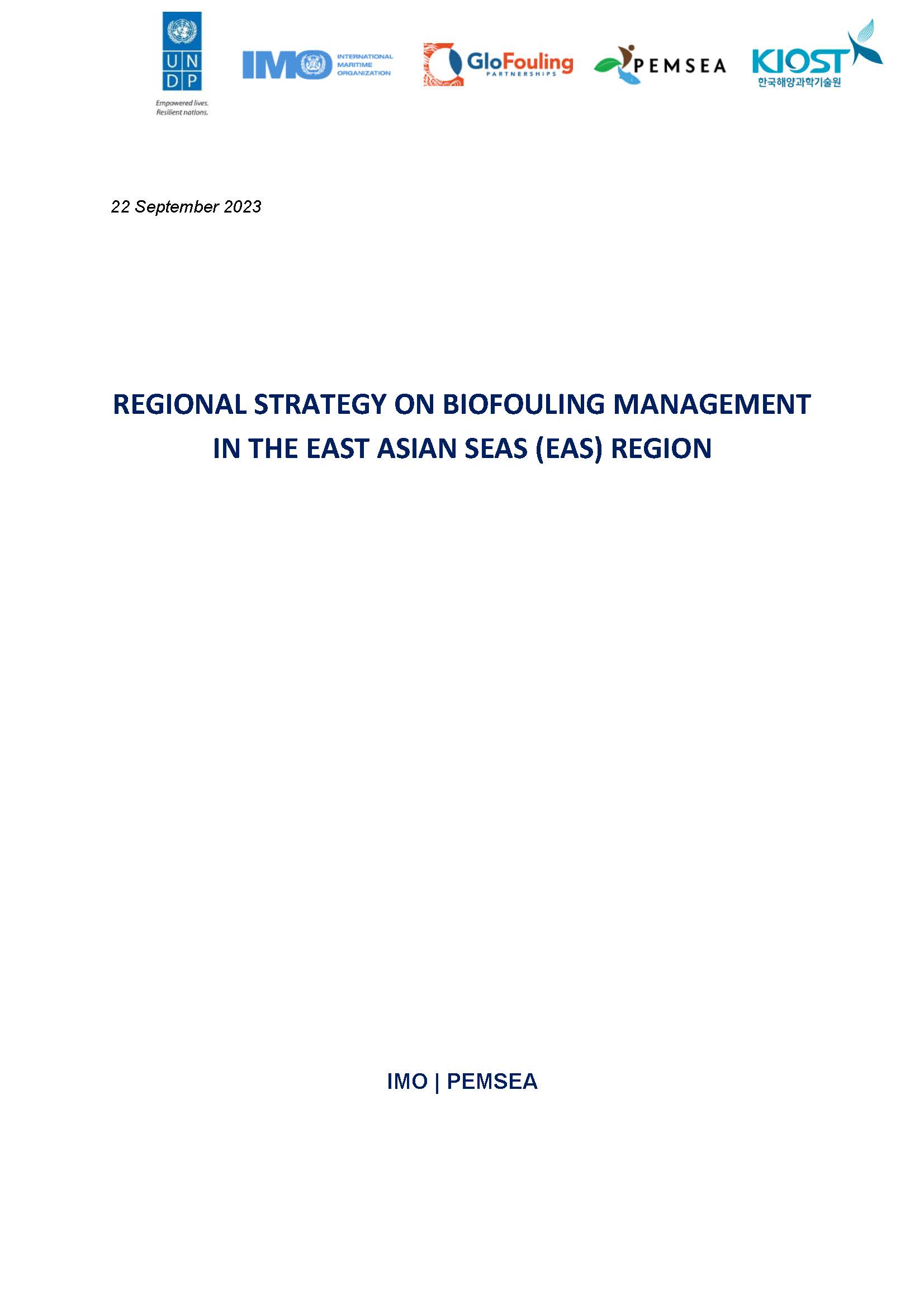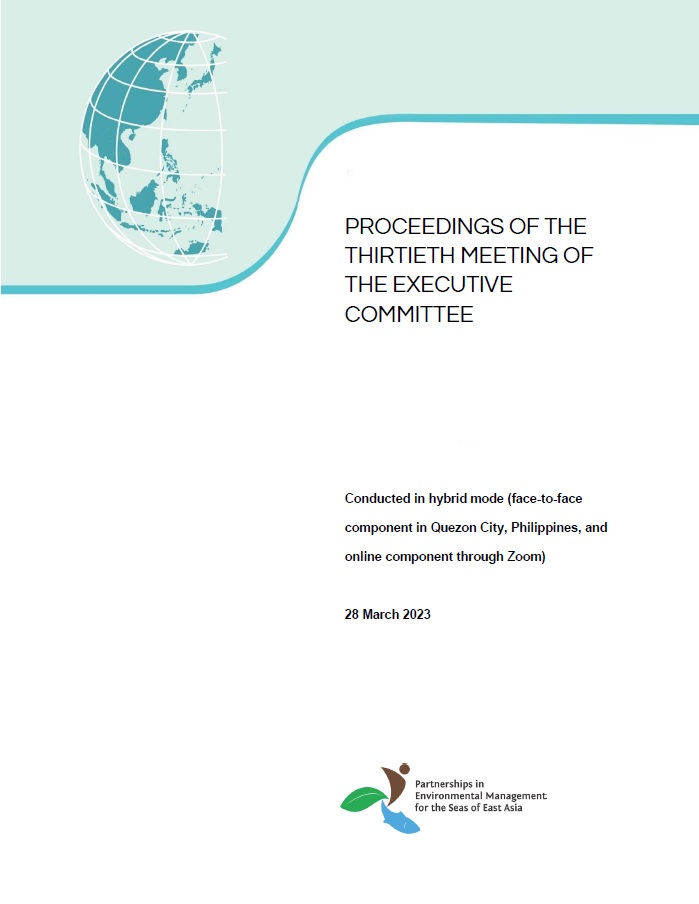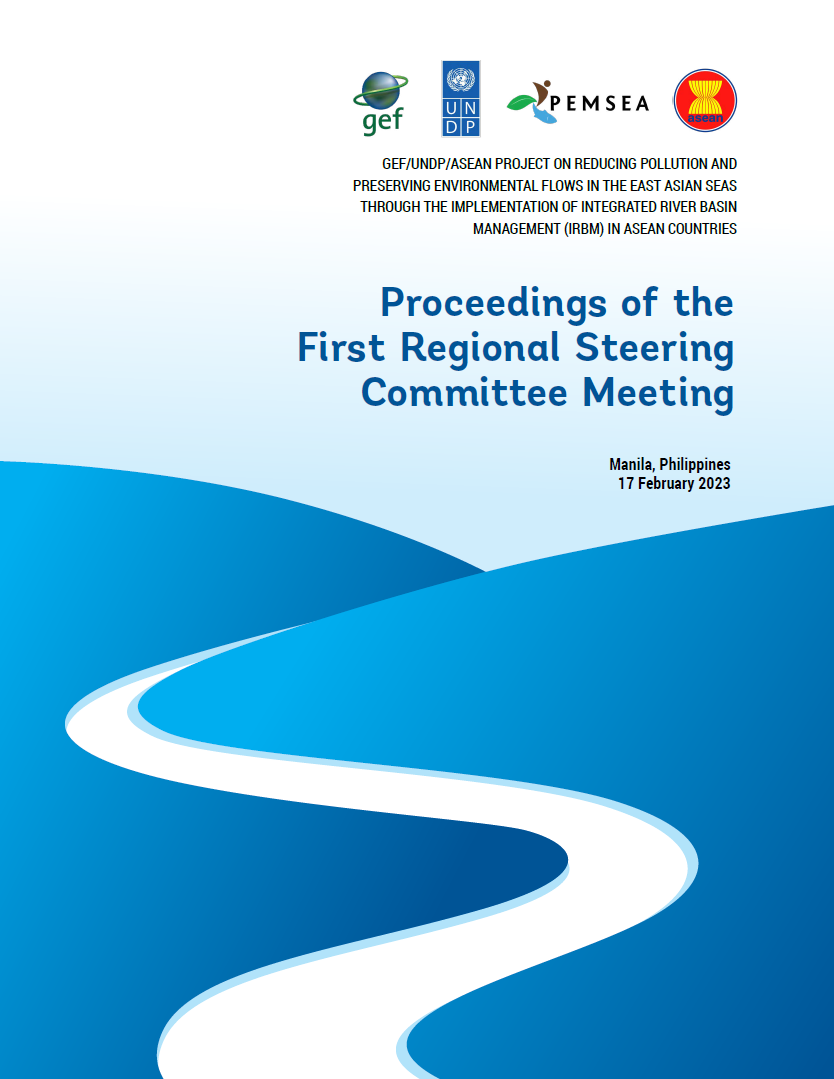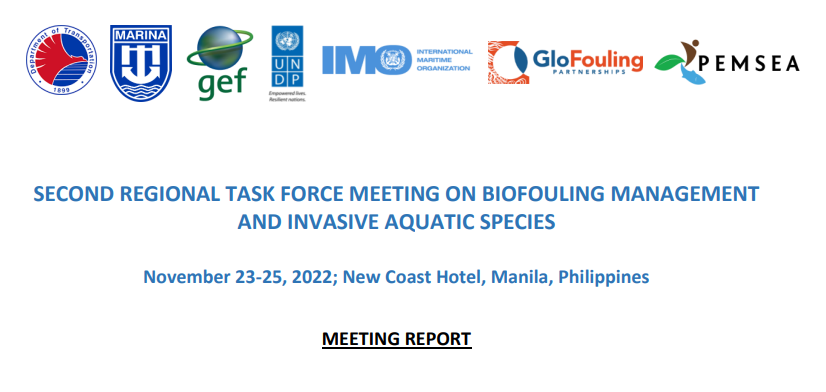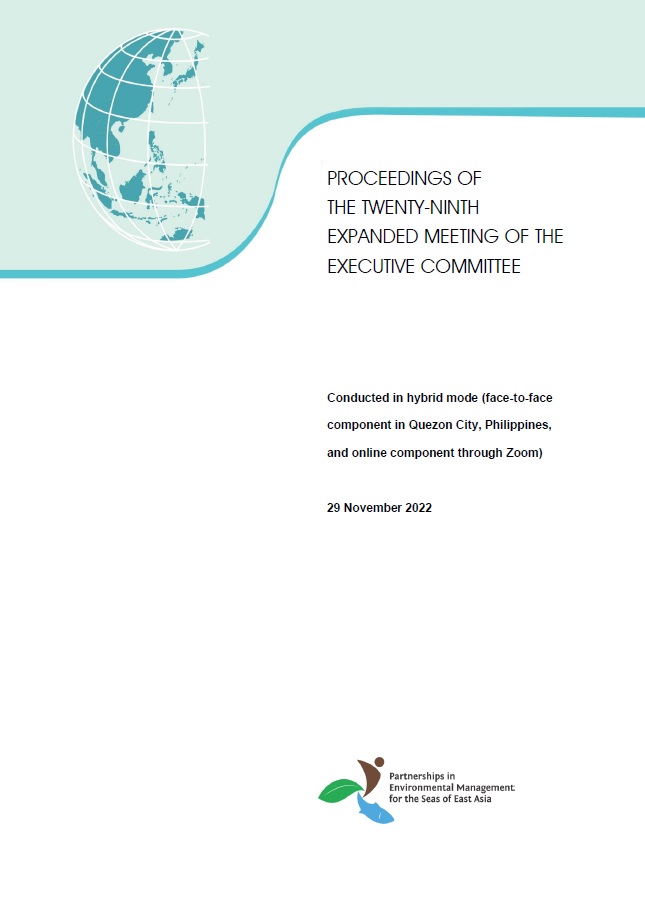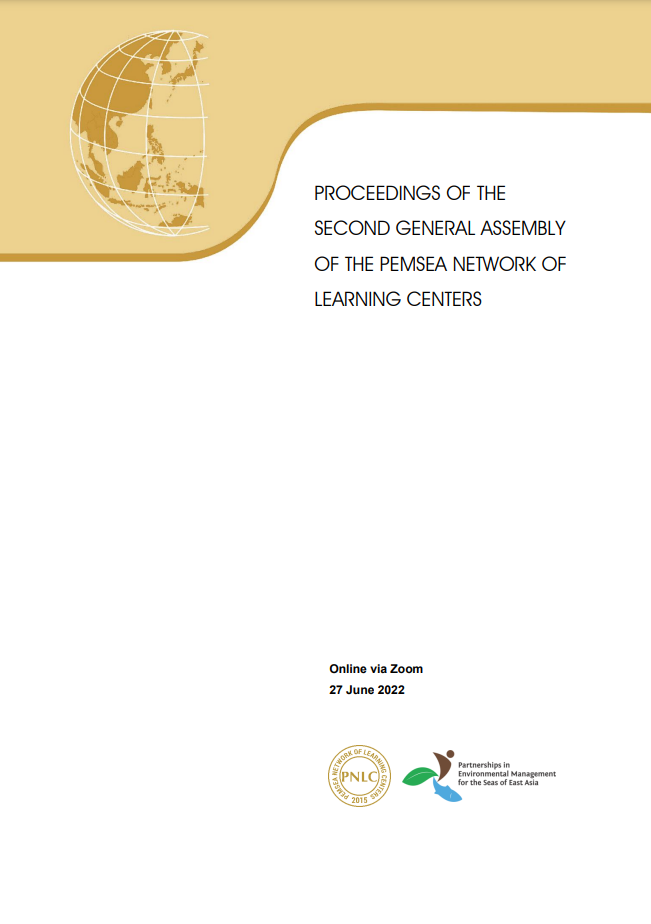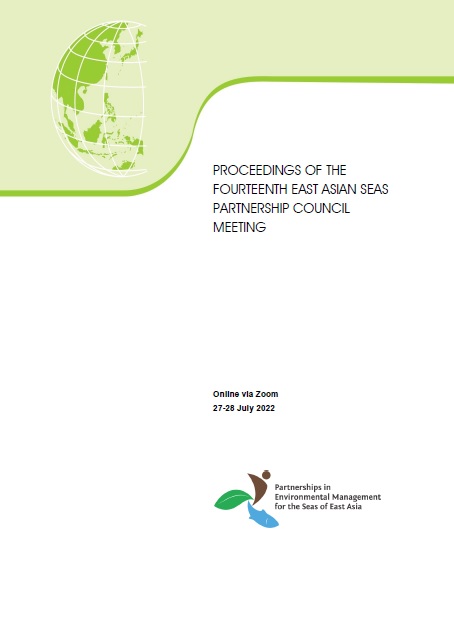
Breadcrumb
Regional Strategy-Biofouling-EAS Region
Over 40% of international trade passes through Southeast/East Asian Seas region. This exposes the region’s marine ecosystems to invasive species attached to shipping hulls and other equipment.
The regional task force on biofouling management adopted the regional strategy on biofouling management which sets out a clear action plan which includes promoting research and development and technology exchange in the region, the establishment of national biofouling governance, the development of sustainable financing mechanisms within national and region levels among other things.
Proceedings of the Fifteenth East Asian Seas Partnership Council Meeting
The 15th EAS PC Meeting was held in a hybrid format on 26-27 July 2023 at the Pan Pacific Hotel, Hanoi, Viet Nam, and via Zoom.
Onsite participants of the meeting included the EAS PC Chair; the Technical Session Chair and Co-Chair; the Intergovernmental Session Co-Chair; the Executive Director of the PEMSEA Resource Facility (PRF); country partners from Cambodia, China, Indonesia, Japan, Lao PDR, Philippines, Timor-Leste, and Viet Nam; and non-country partners from the International Union for Conservation of Nature – Asia Regional Office (IUCN-ARO), Korea Environment Institute (KEI), Korea Maritime Institute (KMI), Ocean Policy Research Institute – Sasakawa Peace Foundation (OPRI-SPF), Oil Spill Response Limited (OSRL), PEMSEA Network of Local Governments (PNLG), and Plymouth Marine Laboratory (PML). Online participants included country partners RO Korea and Singapore; non-country partners ASEAN Center for Biodiversity (ACB), International Environmental Management of Enclosed Coastal Seas Center (EMECS), Korea Marine Environment Management Corporation (KOEM), Marine Biodiversity Institute of Korea (MABIK), and Northwest Pacific Action Plan (NOWPAP). The meeting was also participated onsite by observers from the PEMSEA Network of Learning Centers (PNLC), China PEMSEA Center for Sustainable Development, Viet Nam Administration of Seas and Islands (VASI), and the Department of Environment and Natural Resources (DENR) of the Philippines.
The PRF served as the secretariat.
Proceedings of the Thirtieth Meeting of the Executive Committee
The 30th EC Meeting was conducted virtually on 28 March 2023 via Zoom. Participants of the meeting included the EC, particularly the Chair, Intergovernmental Session Chair and Co-Chair, and the Technical Session Chair and Co-Chair of the EAS Partnership Council (PC) and the Executive Director of the PEMSEA Resource Facility (PRF). Observers from the China PEMSEA Center and the Department of Environment and Natural Resources (DENR) of the Philippines also attended the meeting. PRF served as the secretariat of the meeting.
IRBM: Proceedings of the First Regional Steering Committee Meeting Proceedings
The First Regional Steering Committee (RSC) meeting of the GEF/UNDP/ASEAN Project on Reducing Pollution and Preserving Environmental Flows in the East Asian Seas through the Implementation of Integrated River Basin Management in ASEAN Countries (IRBM Project) was held on February 17, 2023 in hybrid format, i.e., in-person component at Park Inn by Radisson in Manila, Philippines and via video conference (Zoom). The meeting was attended by the Chair of the ASEAN Working Group on Water Resources Management (AWGWRM); National Focal Points (NFPs) of the AWGWRM of Cambodia, Lao PDR, Malaysia, Philippines and Viet Nam; representatives from the ASEAN Secretariat; the United Nations Development Programme (UNDP) – Regional Bureau for Asia and the Pacific, Bangkok Regional Hub and UNDP Country Office in Indonesia and Lao PDR and the East Asian Seas Executive Committee (EAS EC). The Regional Project Management Unit (RPMU), hosted by PEMSEA Resource Facility (PRF), served as Secretariat to the RSC.
Proceedings: Second Regional Task Force Meeting on Biofouling Management and Invasive Aquatic Species
The 2nd RTF meeting was a follow through to the 1st RTF meeting that was convened in April 2022, which endorsed the establishment of a Regional Task Force and the development of a Regional Strategy on Biofouling Management in the East Asian Seas (EAS) region. Since then, a draft Regional Strategy on Biofouling Management has been prepared and circulated to the countries, nongovernment, academic and private sector partners for review. The 2nd RTF meeting aims to further review the draft Regional Strategy and discuss its implementation, as well as to take into consideration the countries and private sectors’ on-going programs or initiatives on biofouling and IAS management.
Proceedings of the Twenty-ninth Expanded Meeting of the Executive Committee
The 29th Expanded PEMSEA EC Meeting was held in hybrid mode on 29 November 2022. The face-to-face component was held at the DENR-BMB Training Center in Quezon City, Philippines whereas the online component was organized through Zoom. It was participated by the members of the East Asian Seas (EAS) Partnership Council (PC).
DOCUMENT NUMBER DOCUMENT TITLE EC/29/DOC/01a List of Meeting Documents EC/29/DOC/01d Provisional Agenda of the Council and Technical Sessions EC/29/DOC/02a Updates on PNLC membership EC/29/DOC/02b Documents regarding CatSU, Philippines EC/29/DOC/02c Documents regarding DLSU-D, Philippines EC/29/DOC/03 Draft PNLC Operational Plan 2022-2027 EC/29/DOC/04a Overview of the finalization of the SDS-SEA IP 2023-2027 EC/29/DOC/04b Third draft of the SDS-SEA IP 2023-2027 EC/29/DOC/04c Overview of the draft GESI Assessment and Action Plan EC/29/DOC/04d Draft GESI assessment and action plan EC/29/DOC/05 Draft Regional Strategy for Ship Biofouling Management in the EAS Region EC/29/DOC/08 Provisional agenda of the Intergovernmental Session EC/29/DOC/09 Updates on the 2022-2023 work plan and budget of PRF
Proceedings of the Second General Assembly of the PEMSEA Network of Learning Centers
The 2nd PNLC General Assembly was organized by the Partnerships in Environmental Management for the Seas of East Asia (PEMSEA) Resource Facility on 27 June 2022 via Zoom. It convened a total of 30 participants from: eight PNLC members from 5 countries (China, Indonesia, Philippines, Thailand, and Timor-Leste); five observing research and higher education institutions from 5 countries (Hong Kong SAR, Indonesia, Philippines, Thailand, and Viet Nam); and PEMSEA Resource Facility (PRF). The event was chaired by Dr. Wansuk Senanan, the incumbent President of the PNLC and Assistant Professor at the Department of Aquatic Sciences in Burapha University (BUU), Thailand. PRF served as the Secretariat of the meeting.
Proceedings of the Fourteen East Asia Seas Partnership Council Meeting
The 14th EAS PC Meeting was held virtually on 27-28 July 2022 via Zoom. It was participated by the incumbent and incoming Chairs and Co-Chairs of the EAS PC, the Executive Director of the PEMSEA Resource Facility (PRF); country partners, Cambodia, China, Indonesia, Japan, Lao PDR, Philippines, RO Korea, Singapore, Timor-Leste, and Viet Nam; non-country partners, namely the ASEAN Centre for Biodiversity (ACB), IPIECA, Korea Marine Environment Management Corporation (KOEM), Korea Maritime Institute (KMI), Northwest Pacific Action Plan (NOWPAP), Oil Spill Response Limited (OSRL), Plymouth Marine Laboratory (PML), and PEMSEA Network of Local Governments (PNLG); and observers from the IPB University of Indonesia, PEMSEA Network of Learning Centers (PNLC), State Key Laboratory of Marine Pollution (SKLMP) in The City University of Hong Kong, and Philippine Country Office of the United Nations Development Programme (UNDP). PRF served as the secretariat of the meeting.
